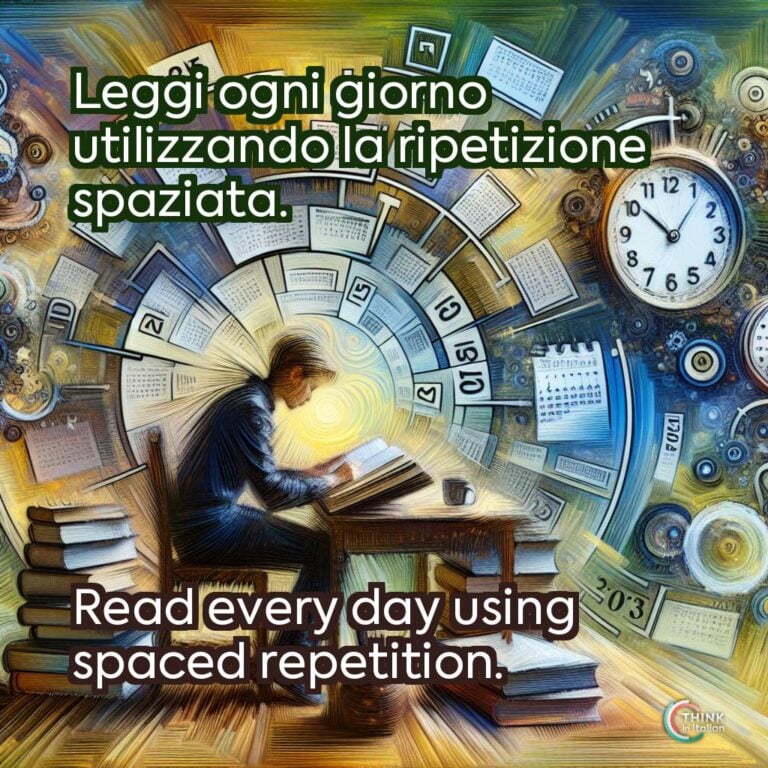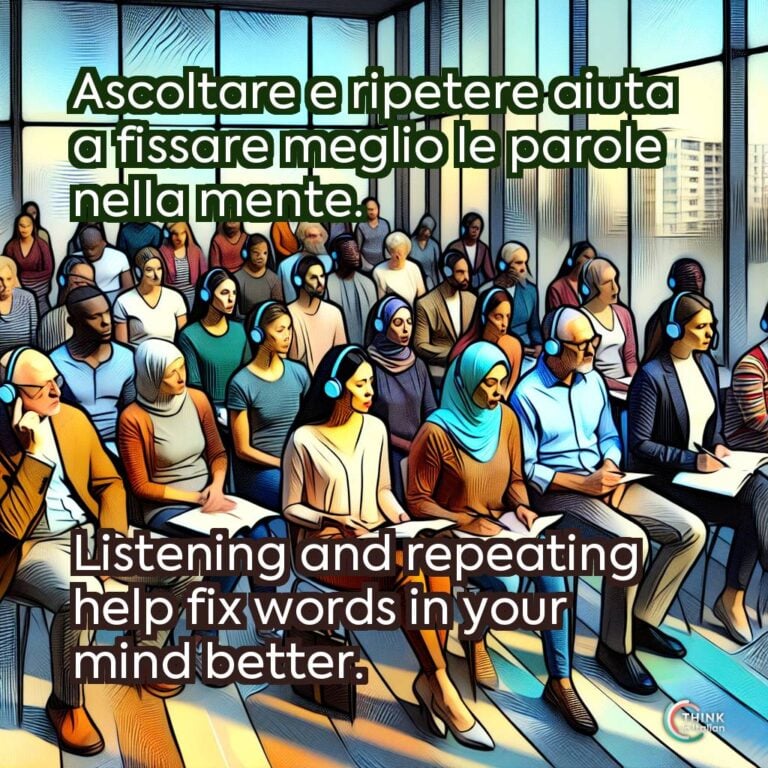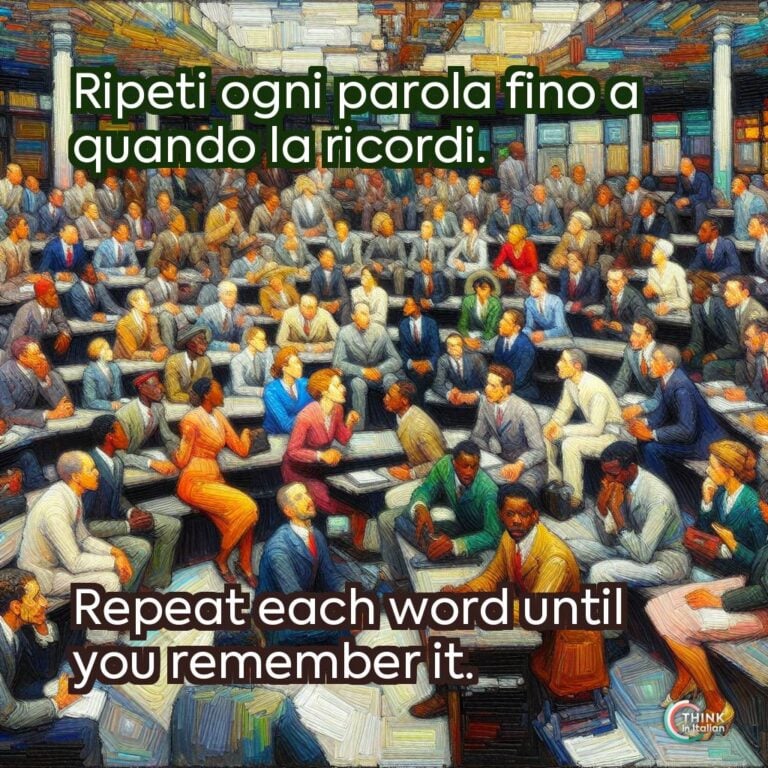From language learning theories to the best Italian course
Ciao! I’m Stefano, the Italian polyglot. I’ll tell you what I know about spaced repetition.
I’m not a scholar in the field of linguistics. I just love learning languages, and I like practical advice as much as you do.
However, that doesn’t mean that theory doesn’t help. It’s important to know how language learning works so that you set realistic expectations and choose the best learning resources.
In this post, I deal with an important concept of language learning that is often mentioned in the marketing pitch of language-learning products: spaced repetition.
I believe that an introduction to the topic is useful because a lack of understanding of language acquisition is often the cause of slow progress and dissatisfaction with methods and products that would otherwise work.
To keep things practical and not too academic, I’ll develop the topic as follows:
- To show how important it is to choose a study method based on this principle, I’ll share with you the case of a language learner in a way that you can relate
- I’ll discuss in depth the theory of second language acquisition involving spaced repetition
- I’ll tell you why I don’t use apps to review vocabulary
- For those who are struggling with the Italian language and want a practical solution, I recommend a specific course that provides plenty of spaced repetition: “Ripeti con me!”

I’m struggling with vocabulary! How do you memorize new words?
Do you find it difficult to memorize vocabulary? Those words just don’t get fixed into your memory.
Well, you’re not the only one:
I’m native Brazilian, and I’m studying Japanese. As you can see, I speak English so you would think I already went through the process of learning vocabulary once, so I should know how it works.
The thing is I feel it took me a very long time to actually learn English, considering how fast most other people I know learned it, and it being so close to Portuguese as it is.
And even in English, vocabulary has always been my biggest problem. It has been something like five years already since I started to be able to actually watch movies in English more or less comfortably.
Here we have a long story of struggle and low self-esteem.
And I still consider my vocabulary to be very poor. And the thing with English is that it comes from the same place as Portuguese, so there are a lot of similarities in the vocabulary.
Now Japanese is all different. There are no similarities at all, and the words all sound the same because the sounds are more limited. So, I’m in trouble.
With relatively easy (similar) languages, you can get by with guessing. However, that doesn’t work with “exotic” languages.
When I listen and read a new word, I can look up the meaning, understand what it means in its context, but literally 5 seconds later, I forgot how to read the word, and in 10 seconds, I already forgot the meaning.
I can increase these times by “insisting” a bit more on that word, like repeating it to myself, writing it down remembering other words that use the same kanji and things like that, but it’s never enough, the moment I wake up the next day, there is no trace of it in my mind.
If I go through a text with 30 sentences, and wake up the next day and try to remember what did I learn from that text yesterday, I will maybe remember one word out of 20 new words in that text, that I spent an hour reading, and reinforce some words that I already knew, and that’s it.
Aiming at memorizing everything would certainly be unrealistic, but 1 out of 20 is certainly not much.
Even the best list of 1000 most common Italian words alone won’t help without context.
Now, I use spaced repetition as well, I spend somewhere around 10min reviewing cards every day, and if I were to put these words that I easily forget as new cards, of course I would remember them.
But how could I possibly do that with 10k or more common words that exist? In 3 months doing that I would easily be spending my whole day reviewing cards, and I can’t even endure 20min of doing that.
And also, with spaced repetition I feel like after a certain point reviewing a card over and over, it gets less and less effective. At some point I have read that card so much, that I’m reading it but my mind is somewhere else, not catching any of the actual meaning of it anymore.
It’s easy to use a good method in the wrong way.
Of course there are a lot of methods I can use to fixate words in my head: looking for more examples, writing it down, flashcards, mnemonics and so on, but whatever I need to do, the problem I have with it is how am I supposed to do that with each one of the 10k plus words that I need to be comfortable with the language?
So I don’t know if there is some issue with the way my mind works, If I’m just too lazy and I don’t study enough, or what it is, but something seems to be wrong with my ability to learn vocabulary, and I need to figure out what it is.
Sadly, these people are frustrated with their poor results to the point that they’re blaming themselves.
How could we “diagnose this patient”?
I believe that it’s not their fault.
They’re obviously motivated to learn. However, their results are disappointing.
Is it their method to blame? Maybe the tools they use to put it into practice? Or how they use those tools?

What is a spaced repetition?
Spaced repetition is a learning method, not just a memorization technique.
It’s an excellent way to remember vocabulary in the future.
The concept is simple: spacing out your study sessions to better retain information to your long-term memory.
- Let’s say that you learn a new word.
- The more you study it, the easier it is to remember.
- Eventually, by way of some strategically timed review sessions, it makes its way into your long-term memory.
The SRS (Spaced Repetition System) is a presentation method that gives you the information before you would forget it and makes sure that it constantly stays fresh in your mind.
So, you might see a word a few minutes after the first time, then a few days later, then a few weeks later, etc. always at the time you need to see it most to make sure it is constantly fresh in your mind.
Initial research on spaced repetition dates back to the 19th century.
A man named Hermann Ebbinghaus created a long list of nonsense syllables (e.g., daus, dor, gim, ke4k …) and memorized them over one year, keeping a record of his progress and using various learning methods.
To check his results, he repeated the same experiment 3 years later. From this experiment, he formed the earliest notions of learning curves, forgetting curves, and spaced repetition.
It took nearly a century of research (by scientists like Piotr Wozniak) to model the forgetting curve mathematically and create an effective algorithm to present information for study at just the right time.
The spaced repetition method of memorization is based on Ebbinghaus’s forgetting curve and the fact that there is an ideal moment to review the information you have learned.
If you review information too early, you’ll waste your time. If you review information too late, you will forget it and will have to re-learn it. The best time to review information is just before you’re about to forget it.
Evidently, it is hard to predict when that time will be. And the time will differ for each person and each piece of memorized information. However, computers (and smartphones) have made it possible to predict the ideal time for review.
As opposed to cramming (trying to memorize lots of things in a short amount of time), this is an ideal revision method.
It takes fewer review sessions (and less time) to memorize new info, and it’s much more sustainable.
Since you’ll focus on the most difficult information, you won’t waste time learning and relearning easy words or words you already know.
It’s not about studying for hours and hours on end. It’s about studying at the right time.
Which is, as you should know by now, right before you forget what you’ve learned. 10 to 15 minutes a day is all it takes to sustainably memorize new foreign-language words and phrases.
Of course, for the technique to work, you have to study your flashcards when you’re supposed to!
Consistency and regularity are both super important if you want to be a successful language learner, even with the best spaced repetition system on the market.
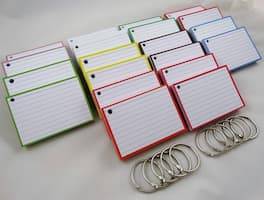
Modern tools for old methods
Randomly or even systematically going through vocabulary in a phrasebook is inefficient.
You might not review the hardest words when you need to, or you’ll keep seeing the easy words too often, or you’ll forget words because you didn’t review them for a very long time.
SRS answers all of these issues by letting you decide when you should see a word again based on certain criteria (usually, how hard you felt it was).
So, the easy words are pushed way off into the future, the hard ones keep constantly reappearing until you are finally happy with them, and the middle-difficulty ones will reappear just when you need them most to refresh your memory.
Deciding when to study a word again when you see it in a printed list is too hard, but that’s where technology comes in!
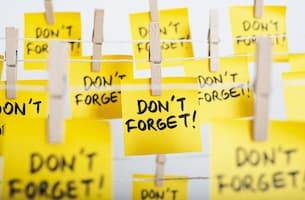
The forgetting curve
Fundamental to the theory of spaced repetition is the idea of the “forgetting curve,” thought up by the German psychologist Herman Ebbinghaus in the late 19th century.
Think of this as the evil twin of the learning curve.
It describes the rate at which you forget something once you learn it, either for the first time or after reviewing it. There is even a formula for it.
It’s a natural phenomenon that’s especially unfortunate for language learners because it proves how difficult it can be to retain the things we learn.
Fortunately, a German psychologist came up with a way to combat the forgetting curve, and today we have the Spaced Repetition System (SRS).
It’s a key feature in all of our apps because it helps users actually remember the vocabulary they learn.
The forgetting curve slopes steeply downward after you first learn something. New material tends not to stay around for long.
This points to why cramming is a bad way to learn. It might help you pass the exam, but you will soon forget everything you were tested on.
Luckily, the curve can be softened by reviewing the information at particular intervals. That is to say, spaced repetition.
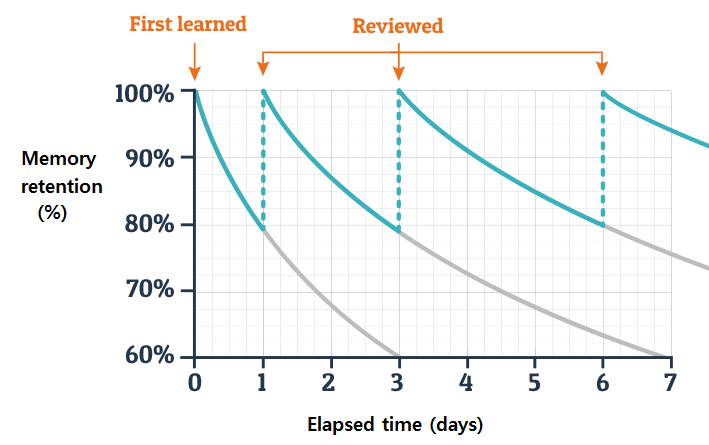
This chart uses a modern version of the formula to show how the curve eases after repetitions.
As you can see in the diagram, you are likely to forget information quickly if you only learn it once. The blue line is pretty steep, meaning that one day after you learn something new, there’s only about a 60% chance you’ll remember it.
For your first review session, the spaced repetition system algorithm will give you information to review shortly after you learn it (between 7 and 24 hours, depending on difficulty).
See how the second curve (in red) is already a lot less steep than the first? That means that it’ll take longer for you to forget the info that you just studied.
The algorithm will present you with information to review less and less often (unless you have trouble remembering it) until you’ve committed the info to your long-term memory.
Finding the time to study
Like many people, I’m a busy guy! I’m trying to work, write books, dramatically improve my level of language, have a social life, and grocery shop/clean/sleep/eat/write blogs & e-mails/exercise, etc. every day.
But there are ways to make time – get it back from the time spent waiting.
When you wait for the bus/metro/train to arrive, wait when ordering coffee in the morning, or wait for your friend to arrive, you’re alone. If you can’t talk to someone, what do you do?
Actually, these little segments are a chance to study some vocabulary!
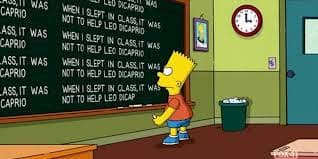
Anki’s flashcards: do they work?
Struggling to remember all the new words that you’re coming across?
Flashcards are a way to memorize a language.
They use a concept called spaced repetition – an algorithm recognizes how well you know each word/flashcard, then prioritizes them so that you study the things you don’t know without wasting precious time on the things you already do.
Anki (for iPhone, Android, and everyone else) is an application developed by Damien Elmes for reviewing things you need to learn using SRS.
Not just vocabulary but city/country capitals, medical terminology, a script for a play, etc. Anything you need to apply to memory really!
There are many similar apps like Quizlet and Memrise.
Here’s an example of an activity you can do with these flashcards.
It’s a more complex version of the flashcard system where you have a word on one side of a card and its translation on the other. You look at the word, test yourself to see if you know it and turn over the card to see the translation.
You couldn’t get more low-tech than that even if you tried, but SRS uses 21st-century technology to make this possible while considering the time dimension.
On the surface, the program does more or less what you would expect from a flashcard – it shows you a word with no translation (the word can be either in your native language or in the target language), and you can decide if you know what it means. Then press “Answer,” and it will show it to you.

The problem with flashcards
Before your trip abroad, you hit the flashcards hard. You memorized how to say essential words and phrases like “hello,” “where is the bathroom,” and “I’ll have a beer.” But once you arrive, it’s like your brain has never encountered the language at all. Words would not come.
It’s not you; it’s how you used the flashcards: Learning a language as an adult takes time and effort, but the go-to study methods that most diligent language learners use are out of date by about a hundred years.
There is a moment in every modern language learner’s studies when they discover spaced repetition systems (SRS) and think, “I have been wasting a lot of time by not doing this.” SRS is a learning system that makes the nitty-gritty of studying hundreds of new pieces of information—say vocabulary words—more efficient. If you’re learning a language, you should be using it.
The problem with Anki, Quizlet, Memrise…
In this hi-tech age, apps for the spaced repetition of flashcards, like Anki, Quizlet, and Memrise, are extremely popular.
Now, I’ll shock you with a confession: I don’t use any of them.
Why? For these reasons:
- Existing flashcard sets are packed with unbelievable amounts of useless or irrelevant words
- A lot of time goes wasted in making your own flashcards: choosing words, finding pictures, etc.
- SRS apps don’t prompt you to speak
- We memorize better if we take longhand notes
Brutally speaking, to me, these apps look like those impressive workout tools that promise to turn you into Schwarzenegger overnight. It makes you feel good that you have it, but you quit using it after a couple of days. And, in any case, the average person can work out fine at home without any special tool.
You might be wondering how I review vocabulary.
Then, invest 1 hour of your time in my webinar on how to learn languages fast.
It will save you years of ineffective studies.

Spaced repetition needs a context
Despite how obviously enthusiastically I’m sharing this system with you, it is important to be aware of the fact that it is just one way to acquire new vocabulary.
The best way, by far, is to hear and apply it in context with native speakers.
Context is what you get watching the news in Italian or reading a story, for example (if the text is not too difficult).
Even if you “knew” all the vocabulary in the world, you still wouldn’t be able to actually apply it in actual conversations if you didn’t work on other skills important to language learning.
Since you usually hear words in isolation (although it’s possible to include example sentences), it means you have no context, and this is quite an artificial way to learn words as simple translations of something from your mother tongue rather than understanding how to use the word itself.
You can’t learn any language just by learning translations.
Someone using too much SRS would not necessarily be any further along compared to someone using other strategies.
On top of this, just looking at the word is not enough, and SRS can turn into nothing more than a fancy version of rote learning by pure repetition if you don’t think harder while using it.
If you are exposed enough times, you will be forced to remember it, but what I prefer is to try to make an image association of the word and/or to think of an example to use it in and say that to myself so that I use it in its right context.
This way, I’m much more likely to remember it next time.
SRS by itself is far from perfect, but if you use it while thinking independently, too, its potential is much greater.
I’m sure lots of you know the feeling that you have learned a word, and you are sure of it, but you just can’t say it.
This may simply be because it’s been too long since you reviewed that word, and using SRS a few minutes a day will make sure that all words you use in the system will never be neglected if you use them right.
Spaced repetition alone is not enough. Don’t expect to blast through 2,000 vocabulary words and be able to use them intelligibly.
SRS is a tool for reinforcing the things that you know are important for your language learning, like words you come across often or grammatical structures that seem useful.
It is no replacement for talking to people in the language you want to learn, writing practice, or reading words in the context of a story or article.
Another thing to take into account for learning words efficiently and avoiding forgetting them is to avoid learning the vocabulary only one way: foreign language to native language, focusing on recognition rather than production.
This focus means a lot of people understand languages but are at a loss when the time comes to speak them.
In this case, you must see words appear in SRS for translation to the foreign language too.

For spaced repetition, a course is better than an app
So far, I have discussed flashcard apps for spaced repetition because they’re insanely popular (I mean that).
My very personal view is that relying on an app for flashcards is not the most efficient or effective way to review vocabulary.
Actually, I don’t even make flashcards!
However, I’m a big fan of audio courses based on spaced repetition.
Why?
Do you remember my reasons for not using Anki?
- Useless or irrelevant words
- Time wasted in making flashcards
- No speaking involved
- Handwriting is better than reading from a screen
Well, my ideal language course is superior in every aspect:
- It’s designed to systematically review useful vocabulary
- It’s ready to use
- It prompts you to speak
- You learn through audio and bypass text
By the way, relying on audio is also a great way to learn Italian in the car.

Conclusion: choose a course based on spaced repetition and use it the right way
As a language learner, I’ve always struggled to find a course based on spaced repetition with a focus on speaking.
A good option for beginners is Pimsleur. The old MP3 version of Glossika was good for the intermediate level.
Anyway, as a serial language learner, I can get by with second-best solutions.
However, as an Italian language teacher, I didn’t want to recommend second-best solutions.
That’s why I made my own course: “Ripeti con me!“
It’s a treasure of comprehensible input, which is vital to master a language naturally.
It will get you to think in Italian.
Check out our Think in Italian Review and decide if it’s the best option to start your learning journey.

Read this review or start a free trial now!
If you’re learning other languages, you could still take this course as a model and look for something similar.

